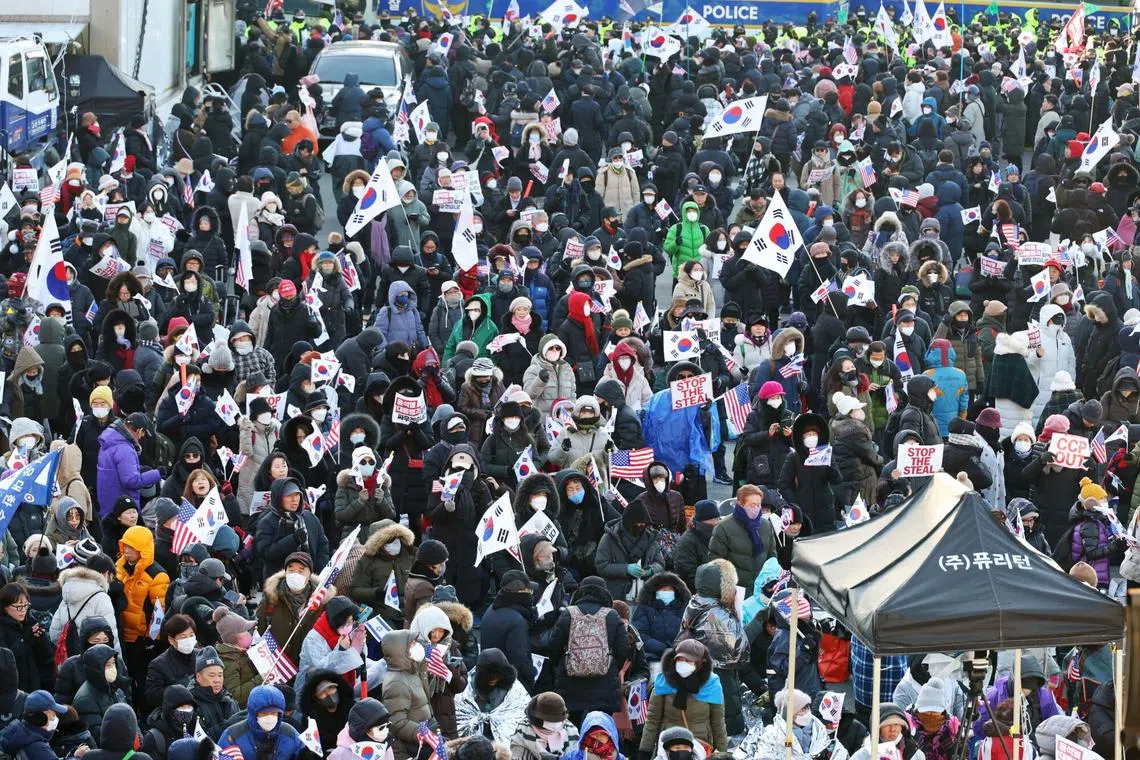Why are more young South Korean men turning up at pro-Yoon protests?
Sign up now: Get insights on Asia's fast-moving developments

Recent poll numbers showing support for Mr Yoon have also centred on men in their 20s and 30s.
PHOTO: BLOOMBERG
Follow topic:
SEOUL - Since the South Korean National Assembly approved the Bill to impeach President Yoon Suk Yeol on Dec 14, 2024, large-scale protests have erupted across the country, with pro- and anti-Yoon demonstrators calling for either his criminal punishment or his reinstatement as president.
Anti-Yoon protests have seen a notable increase in young female participants, while pro-Yoon protests have drawn a large number of men in their 20s and 30s – a shift from the traditional demographic of older conservative supporters, typically in their 50s, 60s or older, who have historically backed Yoon’s People Power Party.
During the protests by the Seoul Western District Court on Jan 18 and 19, a large number of young men in their 20s and 30s were spotted. To protest against the court granting a warrant for Mr Yoon’s extended detention, a mob of protesters, including a few in their 20s and 30s, forcefully entered the court.
According to the Seoul Metropolitan Police Agency, of the total number of 90 attackers who have been taken into custody, 51 per cent – or 46 people – were in their 20s and 30s. The rest spanned across different age groups.
Putting aside such a radical form of protest, the rising presence of young men in rallies supporting Mr Yoon has been evident.
Many young people protesting against Mr Yoon’s arrest were seen near the presidential residence in Yongsan-gu, central Seoul, the morning before Mr Yoon was taken into custody on Jan 15. They held signs reading, “I will fight with President Yoon Suk Yeol” and “Don’t worry, President Yoon Suk Yeol, we in our 20s and 30s are by your side.”
“I was taken aback by the president’s martial law declaration at first, but I trusted that he made the declaration with good intentions,” Mr Lee Tae-kang, a male pro-Yoon protester in his 30s, told The Korea Herald during the protests on Jan 15.
“I believe the president when he says that our politics are rigged and is being driven by pro-North, anti-state forces. Moving forward with the impeachment and his arrest is only going to push our country further back from development.”
Recent poll numbers showing support for Mr Yoon have also centred on men in their 20s and 30s. According to Gallup Korea, approval ratings for Mr Yoon’s party stood at 15 per cent for men in their 20s and 19 per cent for men in their 30s in the third week of December 2024; the numbers increased to 25 per cent and 29 per cent, respectively, in January.
When asked what drives men in their 20s and 30s to stand their ground against Mr Yoon’s impeachment and imprisonment, experts cite their “hatred and distrust” of the main opposition Democratic Party, as a transfer of power to the party could take place if the Constitutional Court upholds Mr Yoon’s impeachment, removing him from the presidency.
“South Korean men in their 20s and 30s often perceive themselves to be disadvantaged compared with women of the same age, mostly due to mandatory military service pushing them back their university studies, or (women) being able to pursue their future goals earlier,” Professor Koo Jeong-woo from Sungkyunkwan University’s Department of Sociology, told The Korea Herald.
“This perception leads to scepticism towards the Democratic Party, which they feel does not represent their interests. Instead, they find themselves relating more to the People Power Party’s anti-feminist rhetoric.”
Prof Koo added that young women’s active participation in protests urging Mr Yoon’s impeachment may have motivated such men to also voice their concerns.
“Past protests urging Yoon’s impeachment, and the National Assembly moving forward with Yoon’s impeachment, generated a reactionary sense of urgency among young conservative men,” Prof Koo explained.
“Such activism has been perceived as a threat to traditional gendered power structures that they seek to preserve and keep.” THE KOREA HERALD/ ASIA NEWS NETWORK

